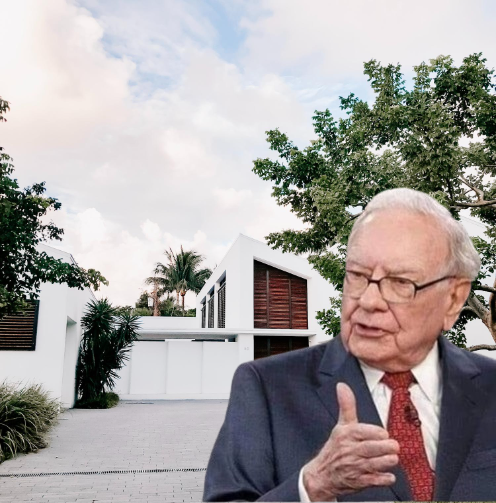Investing Advice from Warren Buffett, who is he?
Who’s Warren Buffett?

“When a person with money meets a person with experience, the one with experience ends up with the money, and the one with money leaves with experience.”
Warren Buffett, an American entrepreneur born on August 30, 1930, in Omaha, Nebraska, has been the CEO and Chairman of Berkshire Hathaway since 1970. He was born as the second child and only son in a family of three children to Leila Stahla Buffett (mother) and Howard Buffett (father).
In 1952, Warren Buffett married Susan Thompson, with whom he had one girl and two boys named Susie, Howard, and Peter. Sadly, Susan passed away in 2004. In 2006, Warren Buffett married Astrid Menks.
Warren Buffett’s educational journey began at Rose Hill Elementary School when he was young. After completing his elementary education, he moved on to Alice Deal Junior High School.
In 1947, Warren Buffett enrolled in Wharton School University in Pennsylvania, and two years later, he joined Alpha Sigma Phi. Subsequently, he transferred to the University of Nebraska.
At 19, he graduated and joined the Columbia School of Business, earning a Master of Science in Economics in 1951. Warren Buffett later pursued further education at the New York Institute of Finance before pursuing his entrepreneurial endeavors.
Warren Buffetts’ Investing Advice
Here’s Warren Buffett’s response when he was asked about his best investing advice for beginners during his 87th birthday.
#1. Invest In What You Fully Know
He believes that if you can’t forecast the future of a business, it’s not worth investing in. A good business, according to Buffett investing advice, is one that you can confidently predict its performance over the next five years in terms of cash flow and profitability.
“Never invest in a business you cannot understand.”
#2. Diversification Is Not Always Good
Buffett challenges the commonly held belief of diversification is always beneficial. He suggests that when there is an opportunity with high potential returns, it’s better to invest big rather than spreading investments too thin.
He argues that diversification can be a protection against ignorance and may not make sense for those who know what they’re doing.
Warren Buffett said, “Opportunities come infrequently. When it rains gold, put out the buck, not the thimble”
Always take advantage when you get a chance.
“Diversification is a protection against ignorance. It makes very little sense for those who know what they’re doing”, said Buffett.
#3. As an Investor, You Don’t Need to Be Rocket Science
Buffett dispels the myth that investing requires complex knowledge or a high IQ. He believes anyone can understand investing basics with patience and diligence. He encourages investors to take their time to evaluate businesses and fully comprehend them, as investing is not limited to specific individuals with specialized knowledge.
He said in his quote,
“You don’t need to be a rocket scientist. Investing is not a game where the guy with the 160 IQ beats the guy with the 130 IQ.”
#4. Differentiate Between Price and Value
“Price is what you pay. Value is what you get,” Warren Buffett.
In his another investing advice for beginners, Buffett highlights the distinction between price and value in investing. He advises investors to focus on the value they can derive from an investment rather than just its price. He says the price is what you pay, but the value is what you get.
#5. Don’t Trust Everyone
Buffett warns investors to be cautious about trusting management blindly. He suggests that if management shows disregard for the interests of shareholders, the stock’s price/value ratio may suffer in the long run, regardless of any assurances given by management. Investors need to scrutinize management decisions carefully.
“Once management shows itself insensitive to the interests of owners, shareholders will suffer a long time from the price/value ratio afforded their stock (relative to other stocks), no matter what assurances management gives that the value-diluting action taken was a one-of-a-kind event,” Warren Buffett.
#6. Always Choose and Focus on the Right News
Buffett is skeptical about stock forecasters and their predictions. He advises investors to be discerning in choosing the news they follow and not rely heavily on stock forecasts. He compares stock forecasters to fortune-tellers and suggests their accuracy may need to be improved.
“We’ve long felt that the only value of stock forecasters is to make fortune-tellers look good,” Warren Buffett.
#7. Embraces A Buy-and-Hold Mentality when Buying Stock
Warren B wrote in his 1996 letter to his shareholders,
“If you aren’t thinking about owning a stock for ten years, don’t even think about owning it for ten minutes.”
Buffett advocates for a buy-and-hold approach when it comes to investing in stocks. He believes investors should think long term and be willing to hold on to stocks for a considerable period, preferably ten years or more, to realize their full potential.
#8. Always Invest in Companies that Have Proven Their Worth
“We make no attempt to pick the few winners that will emerge from an ocean of unproven enterprises. We’re not smart enough to do that, and we know it.” – Warren Buffett
Buffett advises investors to focus on high-quality businesses with a proven track record and promising long-term growth prospects. He cautions against investing in unproven enterprises and suggests that buying an excellent company at a fair price is good than a fine company at an attractive price.
In his 1989 annual shareholder letter, Buffet wrote,
“It’s far better to buy a wonderful company at a fair price than a fair company at a wonderful price.”
#9. Buy S&P 500 Low-Cost Index Fund
Buffett recommends investing in a low-cost S&P 500 index fund, specifically mentioning Vanguard’s, as a superior long-term investment strategy compared to high-fee managers commonly used by pension funds, institutions, and individuals.
“My advice to the trustee couldn’t be more simple: put 10% of the cash in short-term government bonds and 90% in a very low-cost S&P 500 index fund. (I suggest Vanguard’s.) I believe the trust’s long-term results from this policy will be superior to those attained by most investors – whether pension funds, institutions, or individuals – who employ high-fee managers,” Warren Buffett.
#10. Integrity Is More Important Than Money
“If you’re rich you don’t need it, and if you’re poor, you’ve got no business using it,” Warren Buffett.
Buffett advises against borrowing for investments, stating that it’s unnecessary for the rich and unwise for the poor. He also emphasizes the importance of integrity, stating that reputation is more valuable than money.
Losing money for the firm may be forgiven, but losing reputation will be dealt with ruthlessly, according to Buffett’s principles.
“Lose money for the firm, and I’ll be forgiving. Lose a shred of reputation for the firm, and I will be ruthless,” Warren Buffett.
#11. Invest In Yourself First
According to Warren Buffett, investing in yourself is the most valuable investment you can make. Rather than relying solely on the stock market, most individuals will earn the majority of their income through their professional pursuits.
Therefore, prioritize your personal development. Charlie Munger, Buffett’s business partner, shared a comparable perspective. Munger’s secret success strategy entails dedicating an hour each day to self-improvement, emphasizing the importance of investing in yourself.
Closing Thoughts on Warren Buffett’s Investment Advice
Warren Buffett’s investment advice is to invest in what you fully understand, differentiate between price and value, focus on long-term opportunities, be cautious with diversification, and prioritize integrity over money.
He believes investing does not require specialized knowledge or complex strategies but rather a thoughtful and patient approach to evaluating businesses and understanding their potential for long-term success.
